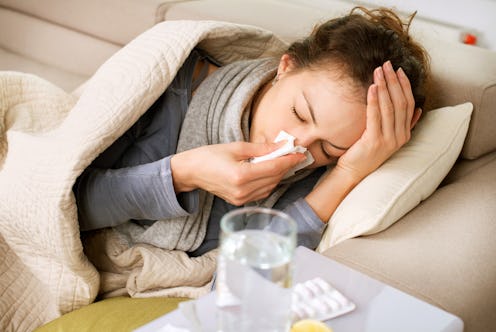Life
7 Ways To Tell If You’re More Likely To Get The Flu
No one enjoys being sick, especially with something as debilitating as the flu. If you're someone who gets sick often, you may be worried that you have a greater chance of catching a virus. To determine how at risk you are, you'll want to watch out for signs you're more prone to catching the flu. Lifestyle habits can all play a role in your immune system, so if you want to avoid getting sick this season, you'll want to pay attention to you what's going on in your body.
Generally speaking, the entire population is at risk for contracting the influenza virus, Dr. Norman Moore, microbiologist and infectious disease expert at Abbott, tells Bustle. The environment you work or live in can determine your risk, along with your age and the presence of chronic illness. Getting a flu shot is most important in preventing the flu, both for yourself and spreading to others.
"It’s also important to get tested by a doctor if you think you have the flu," Dr. Moore says. "Antiviral medications that attack the flu virus work best when administered early and speed your path to recovery."
If you're concerned you may be at a higher risk for infection this season, watch out for these seven signs you're extra susceptible to the flu, according to experts.
1You Didn't Get A Flu Shot
This one's obvious, but it's also the most important. "Although vaccine effectiveness can vary from year to year, getting the flu shot gives you and those around you the best chance of not contracting the virus," Dr. Moore says. Contrary to popular belief, you cannot get the flu from the flu shot. There are a few different types of the flu vaccine, and either they contain an inactivated flu virus or they do not contain the flu virus at all, according to the Centers for Disease Control and Prevention.
2You're Pregnant
Pregnant women (and women two weeks postpartum) are more susceptible to any illness, including the flu. "Pregnant women are more susceptible than women who are not pregnant because their bodies go through changes that can affect their immune system, heart, and lungs," Dr. Moore says.
3You Work With High-Risk People
If you work in, regularly visit, live with, or care for high risk people, you yourself will also be at a higher risk for the flu. "Healthcare workers and caregivers are [not only] extra susceptible to the flu, but they are also highly likely to spread the flu to those they’re around," Dr. Moore says.
4You Don't Get Enough Sleep
That full night's rest is more important than you think "If you are sleep deprived, you have decreased immune function," Adrian Cotton, MD, chief of medical operations at Loma Linda University Health, tells Bustle. When your immune system is down, it makes it harder for your body to fight off any colds, viruses, or diseases — so don't skip out on getting a good night's sleep.
5You Smoke Cigarettes
Like sleep deprivation, smoking cigarettes can wreak havoc on your immune system, which puts you at greater risk for infection. And not only can smoking cigarettes increase your risk of getting the flu, but it can also make flu symptoms worse, according to research out of Yale University. Smokers also have been more likely than non-smokers to die during previous influenza epidemics.
6You Have Other Medical Conditions
Those who have certain medical conditions such as chronic lung disease, heart disease, diabetes, kidney or liver disease tend to also be at a higher risk for contracting the flu. "This is because the body is investing more energy in to keeping them well and alive and has less ability to fight disease," Dr. Cotton says.
7You Don't Wash Your Hands Frequently
Keeping your hands clean is more important than you realize. "Those who don’t wash their hands often with soap and water, touch their eyes, nose and mouth, and don’t clean and disinfect surfaces and objects that may be contaminated with germs are more susceptible to the flu," Dr. Moore says.
Knowing what puts you at risk can help you take the proper steps to prevent getting the flu. And if you are concerned that you are more at risk than others, speak to your doctor about the best ways to stay healthy this season.
